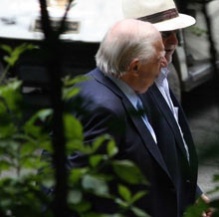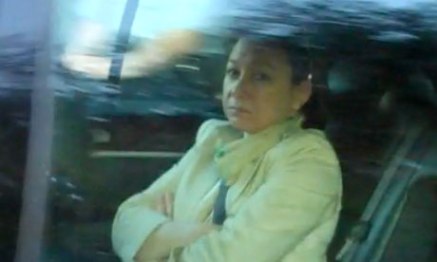This is a story about the storytellers: the spokespeople, the “experts on Syria”, the “democracy activists”. The statement makers. The people who “urge” and “warn” and “call for action”.
It’s a tale about some of the most quoted members of the Syrian opposition and their connection to the Anglo-American opposition creation business. The mainstream news media have, in the main, been remarkably passive when it comes to Syrian sources: billing them simply as “official spokesmen” or “pro-democracy campaigners” without, for the most part, scrutinising their statements, their backgrounds or their political connections.
It’s important to stress: to investigate the background of a Syrian spokesperson is not to doubt the sincerity of his or her opposition to Assad. But a passionate hatred of the Assad regime is no guarantee of independence. Indeed, a number of key figures in the Syrian opposition movement are long-term exiles who were receiving US government funding to undermine the Assad government long before the Arab spring broke out.
Though it is not yet stated US government policy to oust Assad by force, these spokespeople are vocal advocates of foreign military intervention in Syria and thus natural allies of well-known US neoconservatives who supported Bush’s invasion of Iraq and are now pressuring the Obama administration to intervene. As we will see, several of these spokespeople have found support, and in some cases developed long and lucrative relationships with advocates of military intervention on both sides of the Atlantic.
“The sand is running out of the hour glass,” said Hillary Clinton on Sunday. So, as the fighting in Syria intensifies, and Russian warships set sail for Tartus, it’s high time to take a closer look at those who are speaking out on behalf of the Syrian people.
The Syrian National Council
The most quoted of the opposition spokespeople are the official representatives of the Syrian National Council. The SNC is not the only Syrian opposition group – but it is generally recognised as “the main opposition coalition” (BBC). The Washington Times describes it as “an umbrella group of rival factions based outside Syria”. Certainly the SNC is the opposition group that’s had the closest dealings with western powers – and has called for foreign intervention from the early stages of the uprising. In February of this year, at the opening of the Friends of Syria summit in Tunisia, William Hague declared: “I will meet leaders of the Syrian National Council in a few minutes’ time … We, in common with other nations, will now treat them and recognise them as a legitimate representative of the Syrian people.”
The most senior of the SNC’s official spokespeople is the Paris-based Syrian academic Bassma Kodmani.
Bassma Kodmani at Bilderberg
Bassma Kodmani of the Syrian National Council. Photograph: Carter Osmar
Here is Bassma Kodmani, seen leaving this year’s Bilderberg conference in Chantilly, Virginia.
Bassma Kodmani of the Syrian National Council. Photograph: Carter Osmar
Here is Bassma Kodmani, seen leaving this year’s Bilderberg conference in Chantilly, Virginia.
Kodmani is a member of the executive bureau and head of foreign affairs, Syrian National Council. Kodmani is close to the centre of the SNC power structure, and one of the council’s most vocal spokespeople. “No dialogue with the ruling regime is possible. We can only discuss how to move on to a different political system,” she declared this week. And here she is, quoted by the newswire AFP: “The next step needs to be a resolution under Chapter VII, which allows for the use of all legitimate means, coercive means, embargo on arms, as well as the use of force to oblige the regime to comply.”
This statement translates into the headline “Syrians call for armed peacekeepers” (Australia’s Herald Sun). When large-scale international military action is being called for, it seems only reasonable to ask: who exactly is calling for it? We can say, simply, “an official SNC spokesperson,” or we can look a little closer.
This year was Kodmani’s second Bilderberg. At the 2008 conference, Kodmani was listed as French; by 2012, her Frenchness had fallen away and she was listed simply as “international” – her homeland had become the world of international relations.
Back a few years, in 2005, Kodmani was working for the Ford Foundation in Cairo, where she was director of their governance and international co-operation programme. The Ford Foundation is a vast organisation, headquartered in New York, and Kodmani was already fairly senior. But she was about to jump up a league.
Around this time, in February 2005, US-Syrian relations collapsed, and President Bush recalled his ambassador from Damascus. A lot of opposition projects date from this period. “The US money for Syrian opposition figures began flowing under President George W Bush after he effectively froze political ties with Damascus in 2005,” says the Washington Post.
In September 2005, Kodmani was made the executive director of the Arab Reform Initiative (ARI) – a research programme initiated by the powerful US lobby group, the Council on Foreign Relations (CFR).
The CFR is an elite US foreign policy thinktank, and the Arab Reform Initiative is described on its website as a “CFR Project” . More specifically, the ARI was initiated by a group within the CFR called the “US/Middle East Project” – a body of senior diplomats, intelligence officers and financiers, the stated aim of which is to undertake regional “policy analysis” in order “to prevent conflict and promote stability”. The US/Middle East Project pursues these goals under the guidance of an international board chaired by General (Ret.) Brent Scowcroft.

Peter Sutherland pictured at the Bilderberg conference. Photograph: Hannah Borno
Brent Scowcroft (chairman emeritus) is a former national security adviser to the US president – he took over the role from Henry Kissinger. Sitting alongside Scowcroft of the international board is his fellow geo-strategist, Zbigniew Brzezinski, who succeeded him as the national security adviser, and Peter Sutherland, the chairman of Goldman Sachs International. So, as early as 2005, we’ve got a senior wing of the western intelligence/banking establishment selecting Kodmani to run a Middle East research project. In September of that year, Kodmani was made full-time director of the programme. Earlier in 2005, the CFR assigned “financial oversight” of the project to the Centre for European Reform (CER). In come the British.

No comments:
Post a Comment